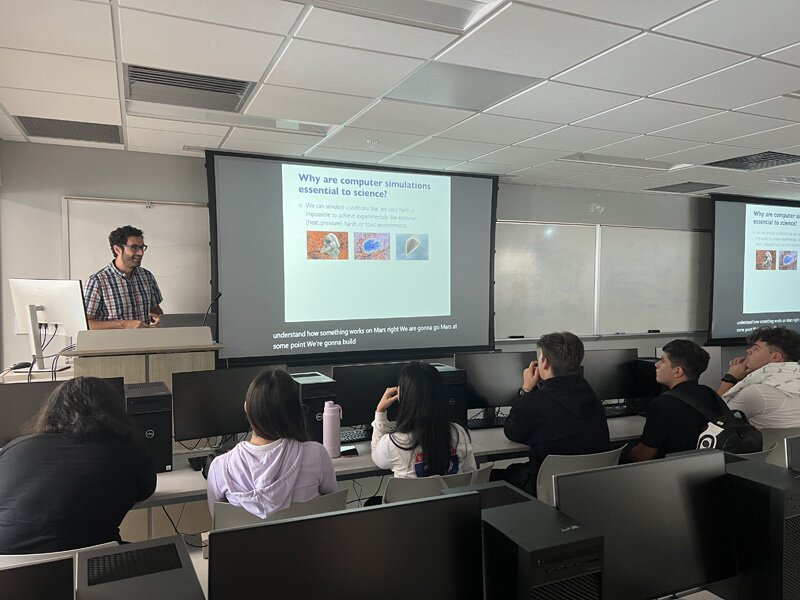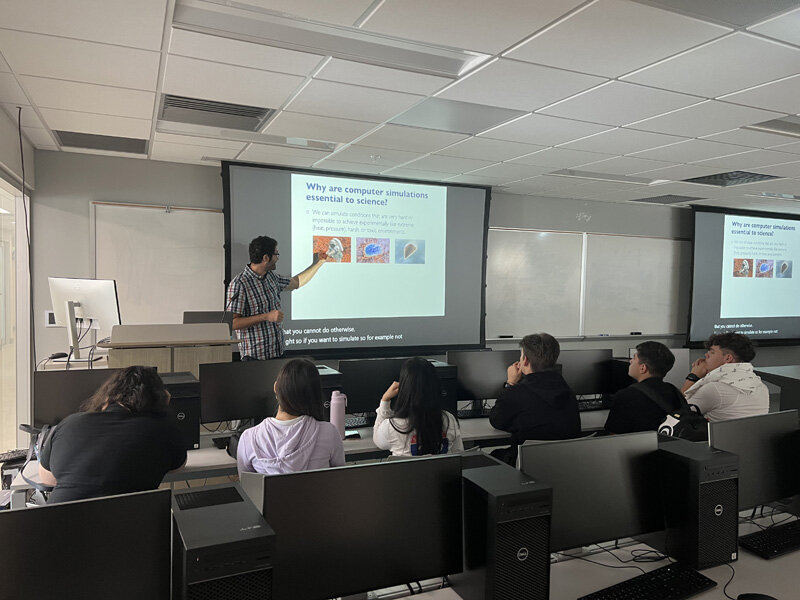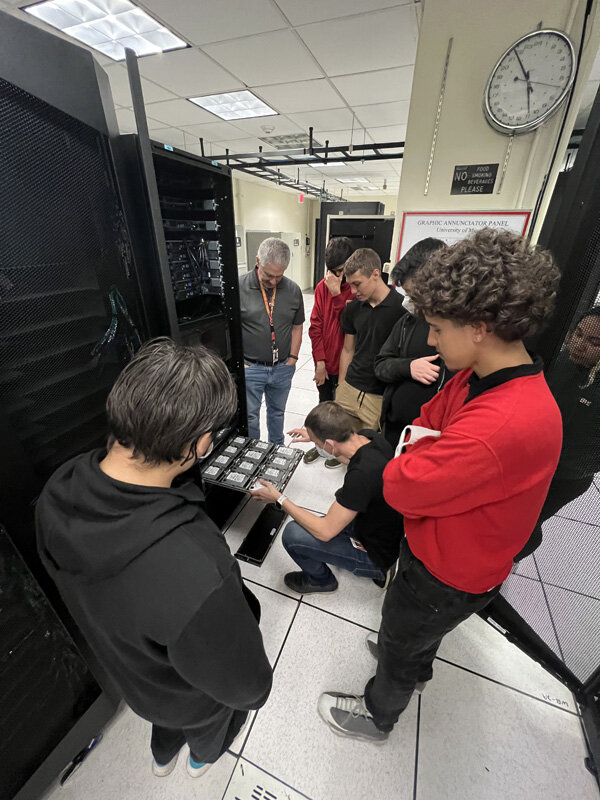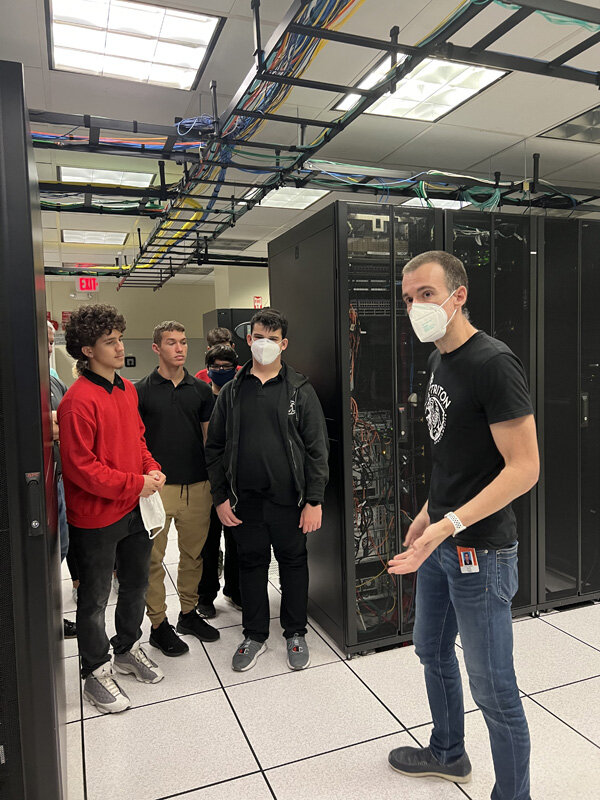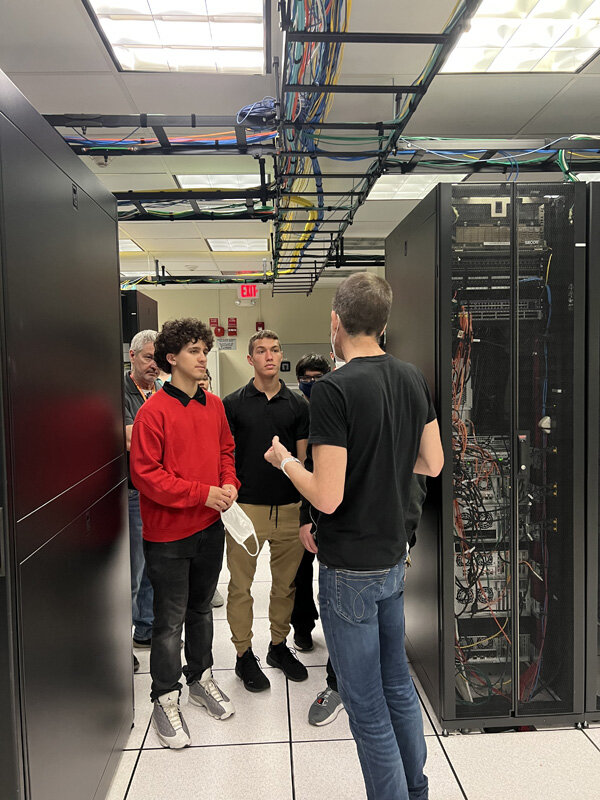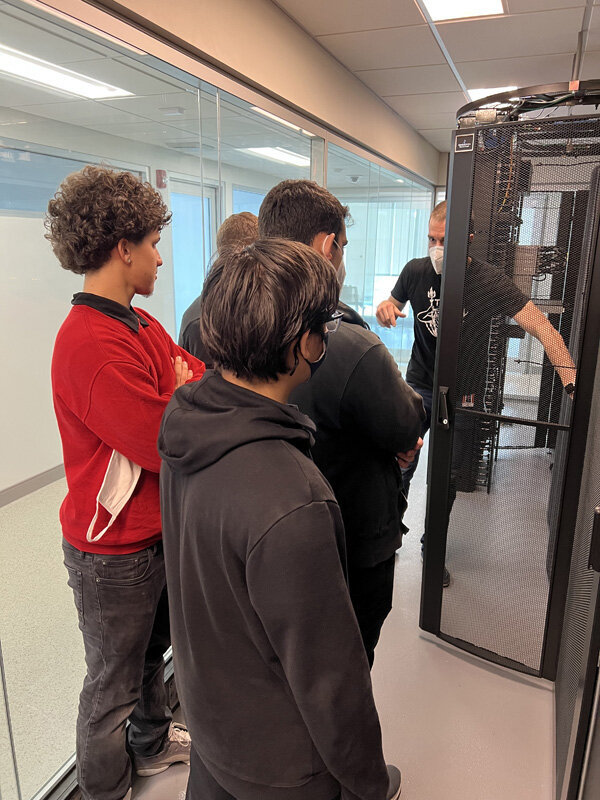
High School Students Learn the Role of Supercomputer Simulations…
A group of students from Southwest Miami Senior High School came to the University of Miami for a visit to examine the role of supercomputer simulations in science. This group was part of the AP (Advanced Placement) Physics class and the Robotics Team coordinated by Mr. Mario Morales, a Physics and Mathematics Teacher at Southwest Senior High School. The visit was a collaboration between the Computational Nanomaterials Laboratory (“CompuNanoLab”), the Department of Computer Science, CIMAS, and IDSC.
The visit took place on Thursday, April 21, 2022 | 10:15 AM – 12:00 PM on the University of Miami Coral Gables campus at the Arthur A. Ungar Building, home to the Visualization Laboratory Room #330-D, and the Department of Computer Science’s Data Center. Program Coordinators included the CompuNanoLab’s Dr. Luis Ruiz Pestrana, CIMAS Director Dr. Ben Kirtman, IDSC Manager of Engagement and Outreach Giannina Bianchi, and IDSC Systems Administrators Nick Alberti and Pedro Davila.
PROGRAM
- 10:15-10:30 AM Climate Science | Dr. Ben Kirtman (Professor Atmospheric Sciences, Director CIMAS, Deputy Director IDSC)
- 10:30-11:30 AM and High Performance Computing | Pedro Davila, Nick Alberti, Giannina Bianchi, IDSC
- 11:00-11:30 AM Computational modeling of materials | Dr. Luis Ruiz Pestana (Professor, Director of CompuNanoLab)
- 11:30 AM-12:30 PM Lunch at Food Court
Climate Science Introduction into computationally based climate models and how they are used to understand climate change and how they are used to predict environmental hazards a few weeks to a few years in advance. The discussion will also include the most recent advances in improving climate models particularly in terms of predicting coastal flood risk (Ben Kirtman).
Information Technology and High Performance Computing Mainframes, Servers, HPC and other resources at the University of Miami.
Multiscale organization and computational modeling of materials. This activity consists of a brief intro to computational materials science. The role of computer simulations as an essential tool to develop the next-generation of advanced materials is discussed as well as how to develop physical models of materials that can be simulated using a computer (Dr. Luis Ruiz Pestana).
About the University of Miami Computational Nanomaterials Laboratory
The CompNanoLab use multiscale computational modeling techniques and theoretical tools from engineering mechanics, statistical physics, and computational chemistry to gain insight into the molecular, nano, and mesoscale mechanisms that govern the remarkable behavior of nanostructured materials. They are particularly interested in understanding a wide range of complex phenomena in disordered, heterogeneous materials with applications ranging from electrocatalysis (e.g., high-entropy alloys) to sustainable infrastructure (e.g., cementitious compounds). Their ultimate aim is to provide physics-based design guidelines based on a fundamental understanding of the processing-structure-property relations for the rational development of advanced materials.
– Dr. Luis Ruiz Pestana
Assistant Professor, Department of Civil and Architectural Engineering
Director, Computational Nanomaterials Laboratory (CompNanoLab)
About the Department of Computer Science (CS)
The Department of Computer Science offers a BS major in Computer Science, a BA major in Computer Science, a 5-year BS+MS program, an MS in Computer Science, and a PhD in Computer Science. The Department also contributes to the university-wide MS in Data Science program. Instruction ranges from introductory programming courses through to advanced courses in faculty research areas.
Faculty research interests include algorithm engineering, applied cryptography & cybersecurity, automated reasoning, bioinformatics, computational complexity, computational geometry & computer graphics, computational neuroscience, data mining & data science, machine learning & neural networks, music information retrieval, robotics, scientific computing, semantic web, and sensors & wireless systems.
– Dr. Victor Milenkovic
Professor, Chair Department of Computer Science (CS)
About the Cooperative Institute For Marine And Atmospheric Studies (CIMAS)
CIMAS is A NOAA Center Of Excellence To Increase Scientific Understanding Of Earth’s Oceans And Atmosphere.
The federally supported institute, located at the University of Miami’s Rosenstiel School of Marine and Atmospheric Science, brings together the research and educational resources of ten partner universities to provide research opportunities, educational training and outreach to students and postdoctoral scientists in NOAA-funded research.
– Dr. Ben Kirtman
Professor, Department of Atmospheric Sciences – Rosenstiel School of Marine and Atmospheric Science (RSMAS)
Director, Cooperative Institute for Marine and Atmospheric Studies (CIMAS)
Deputy Director, Institute for Date Science and Computing (IDSC)
About the University of Miami Institute for Data Science and Computing (IDSC)
As a member of the University of Miami’s Frost Institutes of Science and Engineering, IDSC supports basic and applied research initiatives throughout the University of Miami as well as other leading institutions around the world. We are committed to developing strong partnerships with industry, government, and nonprofit institutions in south Florida, while building bridges to the Caribbean, Latin America, and beyond. We welcome the opportunity to explore how our powerful resources in data science and computing can help you achieve research, training, and business goals.
IDSC also strives to enhance Data Science understanding among our students and the public—helping individuals of all ages including underrepresented minorities—develop the STEM skills needed for professional success in the 21st century.
– Nick Tsinoremas
Founding Director, IDSC Vice Provost for Research Computing and Data (IDSC)



